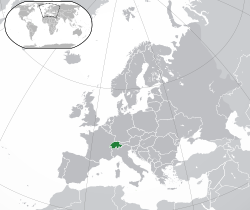
Switzerland
Country in Central Europe / From Wikipedia, the free encyclopedia
Dear Wikiwand AI, let's keep it short by simply answering these key questions:
Can you list the top facts and stats about Switzerland?
Summarize this article for a 10 years old
Switzerland, officially the Swiss Confederation, is a landlocked country located at the confluence of Western, Central and Southern Europe.[lower-alpha 5][13] It is bordered by Italy to the south, France to the west, Germany to the north and Austria and Liechtenstein to the east. Switzerland is geographically divided among the Swiss Plateau, the Alps and the Jura; the Alps occupy the greater part of the territory, whereas most of the country's population of 9 million are concentrated on the plateau, which hosts the largest cities and economic centres, including Zürich, Geneva and Basel.[14]
Swiss Confederation | |
|---|---|
| Motto: (unofficial) "Unus pro omnibus, omnes pro uno" "One for all, all for one" | |
| Anthem: "Swiss Psalm" | |
 | |
| Capital | 46°57′N 7°27′E |
| Largest city | Zürich |
| Official languages | |
| Religion (2020)[3][lower-alpha 2] |
|
| Demonym(s) | |
| Government | Federal assembly-independent[4][5] directorial republic with elements of a direct democracy |
| Walter Thurnherr | |
| Legislature | Federal Assembly |
| Council of States | |
| National Council | |
| History | |
• Founded | 1 August 1291[lower-alpha 3] |
• Sovereignty recognised (Peace of Westphalia) | 24 October 1648 |
| 7 August 1815 | |
| 12 September 1848[lower-alpha 4][6] | |
| Area | |
• Total | 41,285 km2 (15,940 sq mi) (132nd) |
• Water (%) | 4.34 (2015)[7] |
| Population | |
• 2023 estimate | 8,902,308[8] (99th) |
• 2015 census | |
• Density | 207/km2 (536.1/sq mi) (48th) |
| GDP (PPP) | 2023 estimate |
• Total | |
• Per capita | |
| GDP (nominal) | 2023 estimate |
• Total | |
• Per capita | |
| Gini (2018) | low |
| HDI (2021) | very high · 1st |
| Currency | Swiss franc (CHF) |
| Time zone | UTC+1 (CET) |
| UTC+2 (CEST) | |
| Date format | dd.mm.yyyy (AD) |
| Driving side | right |
| Calling code | +41 |
| ISO 3166 code | CH |
| Internet TLD | .ch, .swiss |
Switzerland originates from the Old Swiss Confederacy established in the Late Middle Ages, following a series of military successes against Austria and Burgundy; the Federal Charter of 1291 is considered the country's founding document. Swiss independence from the Holy Roman Empire was formally recognised in the Peace of Westphalia in 1648. Switzerland has maintained a policy of armed neutrality since the 16th century and has not fought an international war since 1815. It joined the United Nations only in 2002 but pursues an active foreign policy that includes frequent involvement in peace building.[15]
Switzerland is the birthplace of the Red Cross and hosts the headquarters or offices of most major international institutions, including the WTO, the WHO, the ILO, FIFA, and the United Nations. It is a founding member of the European Free Trade Association (EFTA), but not part of the European Union (EU), the European Economic Area, or the Eurozone; however, it participates in the European single market and the Schengen Area. Switzerland is a federal republic composed of 26 cantons, with federal authorities based in Bern.[lower-alpha 1][2][1] Switzerland is one of the world's most developed countries, with the highest nominal wealth per adult[16] and the eighth-highest gross domestic product (GDP) per capita.[17][18] Switzerland ranks first in the Human Development Index since 2021 and performs highly also on several international metrics, including economic competitiveness and democratic governance. Cities such as Zürich, Geneva and Basel rank among the highest in terms of quality of life,[19][20] albeit with some of the highest costs of living.[21]
It has four main linguistic and cultural regions: German, French, Italian and Romansh. Although most Swiss are German-speaking, national identity is fairly cohesive, being rooted in a common historical background, shared values such as federalism and direct democracy,[22][page needed] and Alpine symbolism.[23][24] Swiss identity transcends language, ethnicity, and religion, leading to Switzerland being described as a Willensnation ("nation of volition") rather than a nation state.[25] Due to its linguistic diversity, Switzerland is known by multiple native names: Schweiz [ˈʃvaɪts][lower-alpha 6] (German);[lower-alpha 7] Suisse [sɥis(ə)] ⓘ (French); Svizzera [ˈzvittsera] (Italian); and Svizra [ˈʒviːtsrɐ, ˈʒviːtsʁɐ][lower-alpha 8] (Romansh). On coins and stamps, the Latin name, Confoederatio Helvetica—frequently shortened to "Helvetia"—is used instead of the spoken languages.
.svg/125px-Flag_of_Switzerland_(Pantone).svg.png)
.svg/85px-Coat_of_Arms_of_Switzerland_(Pantone).svg.png)